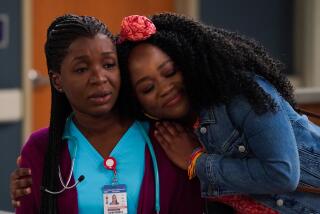CBS Still Has ‘Hope’ for a Cure : Television: David E. Kelley’s ‘Chicago Hope’ was squashed in a highly publicized showdown of medical shows. A new time slot may be just what the doctor ordered.
- Share via
Two medical dramas set in the same town. Two prominent creators. One time period. One winner.
The outcome: One show gets a clean bill of health. The other is disabled.
That’s how many television writers summed up the highly publicized showdown last September between NBC’s “ER” and CBS’ “Chicago Hope.” To “ER,” the victor of the Thursday at 10 p.m. conflict, went the spoils: huge ratings, tons of publicity and accolades to creator Michael Crichton.
After getting hit by a steamroller, “Chicago Hope” has been given a prescription that CBS hopes will cure its ratings ailments and turn it into a long-running hit too: a move to a proven time slot on one of the network’s strongest nights.
Starting Jan. 2, “Chicago Hope” will slip into the Monday schedule at 10 p.m., home for the past 3 1/2 years to “Northern Exposure” (which is moving to Wednesdays at 10 p.m.). In an effort to build interest and momentum for the change, CBS will repeat four episodes on four nights this week--today, Tuesday, Thursday and Friday, all at 10 p.m.
For creator and executive producer David E. Kelley--who is also the creator and executive producer for CBS’ “Picket Fences,” which has won the Emmy Award for best drama the past two years--switching “Chicago Hope” to Mondays is just what the doctor ordered.
*
“To be occupying that prime slot is a real strong demonstration on the network’s part that they consider us to be their future,” Kelley said in an interview at his 20th Century Fox office. “Obviously a lot of people watch CBS on Mondays.”
(NBC is countering CBS’ move with its own preventive medicine: a rerun of the two-hour “ER” pilot from 9 to 11 p.m. on Jan. 2.)
“Chicago Hope” stars Mandy Patinkin, Adam Arkin, E.G. Marshall, Roxanne Hart and Hector Elizondo as a group of skilled surgeons at fictional Chicago Hope Hospital. The character-driven series revolves around the stress of their professional and personal lives.
The Jan. 2 episode, scripted by Kelley, is titled “Quarantine” and puts many of the characters together in a locked room after they are exposed to a potentially fatal virus. The tensions and complicated relations between the characters are exposed layer by layer, at first humorously but progressively more confrontational.
Kelley said the episode is the culmination of several weeks of character development, which may be why viewers have not gravitated to “Chicago Hope” as quickly as to “ER”: “This is a show that we knew from the onset would take a little bit of time. The audience needs to get to know the characters. Learning who and what they are is a slow process. Once you get a sense of who they are, it becomes a richer show.”
Kelley was philosophical and even gracious as he discussed the showdown between “ER” and “Chicago Hope,” saying he has no bitterness about it nor about the attention his competitor has received.
“None of us can sit here and fault the network for a 10 p.m. Thursday time slot,” Kelley said. “CBS thought they were giving us a strong time slot, and it’s not a bad one. We just ran into a real train, coupled with the strong NBC Thursday lineup, that prohibited us from succeeding there.”
Kelley is not unfamiliar with time period woes. He has been frustrated for the last two seasons by the scheduling of “Picket Fences” on Fridays at 10 p.m., saying the show airs at a time “when most of the audience is out. There, we’re competing with lifestyles, not other programs.”
Although he has hopes that “Picket Fences” will eventually be moved to another night, he said it probably won’t happen this season.
*
As an Emmy winner for “Picket Fences” and, earlier, for “L.A. Law,” doesn’t he have the clout to insist on a better time period?
“For both ‘Chicago Hope’ and ‘Picket Fences,’ we have been arguing for the best time slots,” he said. “A show deserves the clout, not the producer. A producer should not be able to demand and get time slots. If they deliver a show that is worthy of getting a better showcase, then they should get it. That’s how I feel about ‘Picket Fences.’ But I wouldn’t ever ask CBS to move ‘Picket Fences’ for the sake of preserving my relationship with them.”
He’s grateful that “Chicago Hope” is getting another opportunity: “We still feel very proud of our product, and we like to think that our shows are getting better as we go along. I think our numbers will come up when we move to Mondays. But they will never be ‘ER’s’ numbers. ‘ER’ is a phenomenon.”
CBS Entertainment President Peter Tortorici said he has the utmost confidence in “Chicago Hope’s” ratings potential.
“This is too good a show for audiences to miss it,” he said. “Monday night is our franchise night, and we have the kinds of viewers that will welcome ‘Chicago Hope’ to the evening. We feel the move will help us get the audience that will make ‘Chicago Hope’ a hit.”
Of the loss to “ER” on Thursdays, Tortorici said, “We went into a situation where there was a jump ball. We were up against a tradition of NBC’s strong 10 p.m. slot and a strong lead-in, and we gave it our best shot. Going into the season, we had confidence that we had the better show. As it turned out, they did a marvelous job, and we didn’t get the attention we felt we should have. So, next.”
Kelley, asked about the differences in the two series, said: “ ‘Chicago Hope’ is a show about relationships, with the medical arena as a backdrop.”
“ ‘ER,’ from what I’ve seen, really tries to capture the frenzy of that particular arena and deliver to its audience the tumult and adrenaline of a certain place.”
Kelley said he was bothered by some of the commentary on “Chicago Hope’s” ratings defeat: “What was frustrating was that a lot of those critics who did champion us in the beginning were suddenly writing articles 10 days later with analyses of why ‘ER’ won and why ‘Chicago Hope’ lost. Sometimes when you’re the underdog, you rely on and hope for the media to point out that, even though the numbers aren’t what we hoped for, the quality is still there.”
He was particularly irked by criticism that “Chicago Hope” was more old-fashioned than “ER.”
“That’s typical of some of the stuff that came out after the numbers did,” he said. “It was like, ‘Since “ER” is new, let’s characterize “Chicago Hope” as old.’ I guess we are more conventional, but we try to tell stories that are rich in human drama and character. If those stories are old-fashioned, then I’ll be obsolete very soon.”
More to Read
The complete guide to home viewing
Get Screen Gab for everything about the TV shows and streaming movies everyone’s talking about.
You may occasionally receive promotional content from the Los Angeles Times.







